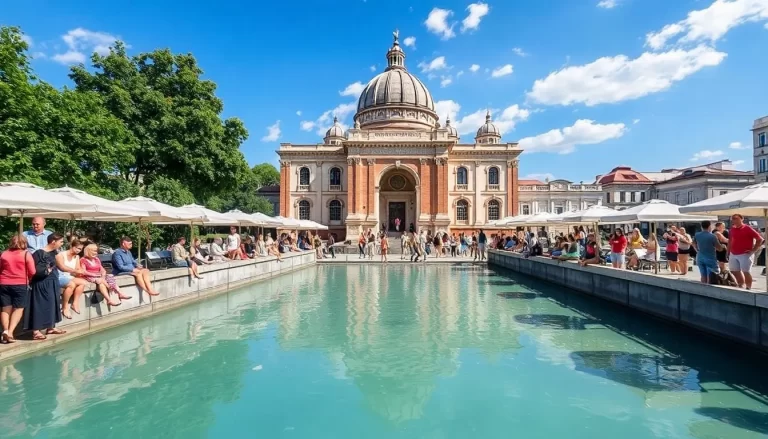Traveling can often evoke a sense of adventure and wonder, but it can also lead to disillusionment when we constantly chase after the next best experience. The notion that «the grass is always greener on the other side» serves as a reminder to appreciate the journey rather than simply seeking the ideal destination. This article delves into the complexities of travel, exploring the insights gained from various cultures and the commonality of human experience across the globe.
The allure of the other side: Understanding the phrase
The phrase «the grass is always greener on the other side» encapsulates the human tendency to believe that others have it better than we do. This mindset can lead to dissatisfaction in our current situations, whether in relationships, careers, or even travel choices. As we embark on new adventures, it’s essential to recognize that every place has its own set of challenges and rewards.
This saying serves as a cautionary tale. Often, our imagination embellishes the possibilities of what lies beyond our immediate experience. Yet, upon closer examination, we find that every location has its unique aspects that may not always align with our expectations.
What does the phrase really mean?
At its core, «the grass is always greener on the other side» suggests that people tend to underestimate the value of what they have while overestimating the appeal of what they don’t. This phenomenon is often magnified in travel when we find ourselves in awe of exotic locales, believing they offer a paradise absent in our daily lives.
- Comparison Trap: It’s all too easy to fall into the trap of comparing our circumstances to those of others, leading to feelings of inadequacy.
- Perception vs. Reality: What we perceive as a perfect life elsewhere often hides its own set of difficulties.
- Appreciating the Present: Recognizing the beauty and opportunities within our current situation can lead to greater happiness.
Travel experiences: Beyond the postcard
Many dream of escaping to far-off lands, envisioning picturesque landscapes and vibrant cultures. However, the reality of travel is often more nuanced. While experiences like exploring ancient ruins or lounging on pristine beaches are undeniably beautiful, they often come with their own challenges.
For instance, during my time on the island of Ko Lipe, I enjoyed breathtaking sunsets and the warmth of the local people. However, it wasn’t without its contrasts. The island was bustling with tourists, and the authenticity I initially sought felt diluted. This scenario highlights that even in seemingly perfect destinations, the reality can differ significantly from our expectations.
Why do we chase after the elusive ‘elsewhere’?
Our fascination with «elsewhere» stems from a deep-seated desire for change and adventure. We often romanticize the idea of living a life free from routine and filled with excitement. Yet, the more we travel, the clearer it becomes that daily life, regardless of location, shares many similarities worldwide.
People everywhere worry about their families, jobs, and futures. They seek joy in small moments, whether that’s sharing a meal with family or enjoying a quiet evening. This commonality challenges the idea that life is inherently better in another place.
Grass is greener syndrome: A deeper dive
The «grass is greener syndrome» refers to the persistent belief that others are enjoying a better life than we are. This mindset can lead to unhappiness and poor decision-making. In travel, it manifests as a constant search for the «next great adventure,» often at the expense of enjoying the present moment.
Here are some characteristics of this syndrome:
- Restlessness: A never-ending desire to seek new experiences without appreciating current ones.
- Discontentment: Feeling unsatisfied with life because of the false belief that others have it better.
- Fear of Missing Out (FOMO): The anxiety that arises from not experiencing what others are enjoying.
Learning from different cultures
Through travel, we gain insight into how different cultures navigate the same challenges we face. For example, during my travels in Japan, I observed a culture that prioritizes politeness and community, contrasting sharply with the more individualistic approach often seen in Western societies. This diversity enriches our understanding of human experience.
Consider how various cultures celebrate life:
- French wine culture: A deep appreciation for wine reflects a broader passion for savoring life.
- Scandinavian simplicity: Minimalism in lifestyle choices emphasizes contentment with less.
- Latin American vibrancy: Festivals and family gatherings highlight the importance of connection and joy.
Finding joy in the mundane
Traveling often leads us to believe that excitement is found in grand experiences, but everyday life can be equally rich. Bill Bryson aptly noted that we travel to watch people engage in the mundane activities we perform at home, revealing that our routines, while familiar, are also filled with beauty and significance.
The moments spent at local markets, sharing a meal, or simply enjoying a sunset help us recognize our common humanity.
Embracing our shared human experience
After years of wandering the globe, I’ve come to realize that people everywhere are united by similar hopes, dreams, and struggles. Understanding this shared experience fosters empathy and connection, allowing us to appreciate the world around us, regardless of where we find ourselves.
For instance, living in Bangkok presented me with daily challenges that mirrored those I faced back home. Despite the geographical distance, the essence of life remained unchanged, reminding me that we are all players in the same human drama.
The real journey: Discerning what matters
Ultimately, the most enlightening lesson travel imparts is that the true essence of life is not tied to our location but to our mindset. When we shift our focus from what we lack to what we have, we cultivate gratitude and contentment.
As you plan your next adventure, consider this: the grass may not be greener on the other side, but by watering your own lawn—embracing the present moment—you can create beauty and fulfillment right where you are.
Practical travel tips for a richer experience
To enhance your travel experiences and maximize your enjoyment, consider the following practical tips:
- Stay curious: Engage with locals to understand their way of life and gain new perspectives.
- Embrace spontaneity: Allow for unplanned moments that can lead to unexpected joy.
- Document your journey: Keep a travel journal to reflect on your experiences and lessons learned.
- Practice gratitude: Take a moment each day to appreciate the small joys of your travels.
- Connect with fellow travelers: Share stories and experiences to enrich your understanding of different cultures.
Conclusion: A journey of self-discovery
In the end, the quest for travel is not solely about discovering new places but is also a journey of self-discovery. As we explore the world, we learn to appreciate not only the diverse cultures we encounter but also our own lives. The richness of human experience lies in our shared struggles and joys, reminding us that, no matter where we go, we are all part of a larger narrative.







